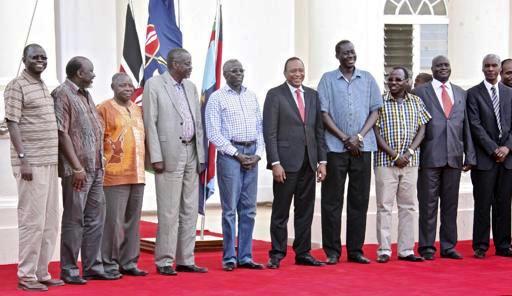Released SPLM leaders to participate in S. Sudan talks: mediators
February 5, 2014 (ADDIS ABABA/JUBA) – IGAD peace mediators invited the recently released seven leaders of the Sudan People’s Liberation Movement in Opposition (SPLM-In-Opposition) to participate in the peace talks after delaying it for three days.

On 29 January, Juba released seven SPLM figures accused with four others who remain in jail of plotting to overthrow the regime of president Salva Kiir, a charge they denied. Their release came after an agreement signed by the two warring parties in South Sudan on 23 January where they admit the role they “can play in the ongoing political dialogue”.
Following a visit to Nairobi where they met with the Kenyan president Uhuru Kenyatta, the three Ethiopian, Kenyan and Sudanese IGAD Special Envoys met with the seven SPLM-in-Opposition leaders to discuss the next round of talks which will start on 10 February instead of the 7th of this month as it had been initially announced.
“The released detainees expressed their commitment to be part of the IGAD mediation process for political dialogue and national reconciliation in the Republic of South Sudan,” said a statement the mediators released on Wednesday.
“In light of this, the mediation team has sent them an invitation letter to participate in the political process and they have confirmed”, they added.
The IGAD envoys further disclosed their plans to visit Juba to meet president Salva Kiir Mayardit and other government officials. Also, they will meet with the former vice-president and rebel leader Riek Machar .
The meetings with the South Sudanese parties aim to discuss the framework of the second round of talks where the parties are supposed to discuss the root causes of the conflict, particularly issues of democratic reforms and transparency in the country.
Civil society groups and religious leaders said they want to be part of this process to discuss the organisation of the young state and the needed political and social reforms. It is not clear if they will be part of the political talks or will have a consultative role in a separate forum for stakeholders.
IGAD MONITORS DEPLOYMENT
On 2 February, an advance team of the IGAD technical committee arrived in Juba to establish the Monitoring and Verification Mechanism for the implementation of the cessation of hostilities agreement signed on 23 January.
The 14-member team led by the Ethiopian Major General (rtd) Gebreegzabher Mebrahtu and his deputy the Sudanese Major General Mohammed Amin Moustafa Eltinay will assess the situation and determine the sites of monitoring before the deployment of the military observers in the conflict areas.
The advance team will report back to the IGAD mediators in Addis Ababa on 7 February with recommendations on the way forward.
South Sudan information minister Michael Makuei Lueth in a press conference held in Juba on Wednesday regretted the delay in the set up of the monitoring teams.
“We agreed to set up a monitoring and verification mechanism to monitor the conformity of the parties with the agreement to monitor whatever violations that may happen. Unfortunately, this body is not yet set up; up to now,” he said.
Lueth further said there was no agreement on the “advance team”, adding that Juba finds it strange to cooperate with teams whose composition was not part of the signed documents.
(ST)
